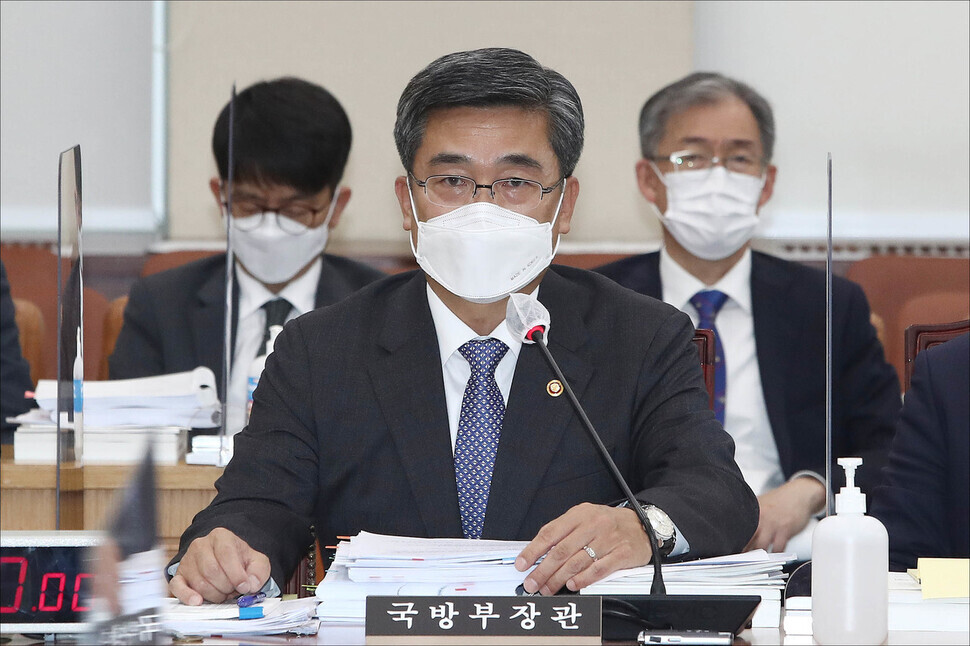hankyoreh
Links to other country sites 다른 나라 사이트 링크
[Column] Resetting the relationship: The transformative potential of an end-of-war declaration


During the Cold War, the UK possessed over 550 nuclear warheads, but the US didn’t regard it as a threat. It conducted 45 nuclear tests starting in 1952, but these were not characterized as “provocations.”
If anything, the US supported the UK in its nuclear weapon development. It was even generous enough to provide its own nuclear weapons to the British military at a time when the latter’s nuclear weapon production had slowed.
Each of North Korea’s six nuclear tests has resulted in it being criticized for its “provocations” and hit with UN sanctions. It is estimated to have dozens of nuclear warheads, which are regarded as a serious security threat.
Its development of missiles and submarines as ways of firing those warheads has also been seen as a serious security threat. Missile defense and “enemy base strike capabilities” are viewed as necessary for security.
Alexander Wendt, a US political scientist, asks: Why is this the case? He places a question mark on something most people in South Korea and the US take for granted.
On their own, nuclear arms are weapons of mass destruction, capable of destroying cities and killing huge numbers of people. A nuclear weapon is an “object” with the ability to cause enormous loss of life, regardless of who possesses it. So why is it perceived as having the opposite meaning in social and political terms?
Responding to questioning during a general audit before the National Assembly Foreign Affairs and Unification Committee, South Korean Minister of Foreign Affairs Chung Eui-yong said, “North Korea’s military displays are clear violations of UN Security Council resolutions, which means they are against international law. We [South Korea] are developing our weapon systems within the framework of international law.”
According to this view, North Korea’s development of nuclear weapons is a violation of the Treaty on the Non-Proliferation of Nuclear Weapons and UN Security Council (UNSC) resolutions. It’s also a violation of UNSC resolutions for North Korea to test ballistic missiles.
It’s in violation of international law, ergo, it’s a provocation. That one fact differentiates it from the UK’s weapon development and South Korea’s missile testing, which have taken place within the framework of international law.
Such reasoning is superficial. It accurately conveys the facts, but in doing so, it fails to answer another question: If nuclear weapons are nuclear weapons and missiles are missiles, why is it legal for one side to possess them but a “provocation” for the other side to have them?
Wendt offers penetrating insights in his book “Social Theory of International Politics,” which systematically fleshes out a constructivist theory of international politics. He sees the answer as lying in national identity.
We share certain “identities” for countries, based on a long history of interactions. In South Korea, the most prominent identity for the US is that of “ally.”
That means that the enormous destructive potential that the US possesses is seen as central to South Korea’s security. US nuclear weapons translate into a safe South Korea; British nuclear weapons are a means of protecting the US.
In the eyes of South Korea and the US, North Korea is an “enemy state.” Having already invaded the South once before, North Korea is seen as eagerly awaiting the opportunity to do so again.
With North Korea identified as “the enemy,” even a tree branch looks like a cudgel in its hands — never mind a nuclear weapon, which is seen as a threat to South Korea’s survival and a potential challenge to US national security.
Whether nuclear weapons and missiles are seen as “threats” or as “safety valves” comes down ultimately to one’s relationship with the state possessing them. In a hostile relationship, each side identifies the other as an enemy. As Wendt explains, it is all a matter of identity.
If we hope to resolve this problem, we’re going to need new identities. We must reset our antagonistic relationships.
The importance of a declaration officially ending the Korean War lies in its potential to usher in that sort of reset process.
Obviously, a declaration alone is not going to redefine our relationships. A couple that breaks up isn’t going to fix things simply by declaring that they’re getting back together. Both sides must make considerable efforts.
South Korean Minister of National Defense Suh Wook has been speaking cautiously about North Korea’s recent submarine-launched ballistic missile launch activities, which he has avoided referring to as “provocations.” While this is crucial, it’s not enough.
If South Korea were to declare that the weapon systems it’s developing aren’t meant for the North, would that make Pyongyang rest easy? If it said its joint military exercises with the US don’t target the North, how many North Koreans would conclude that there was no longer any need to worry about them? If officials in the Joe Biden administration declare that they have “no hostile intent,” would anyone in North Korea believe that peace is at hand?
Leader Kim Jong-un recently declared that North Korea’s archenemy is “war itself,” not South Korea, the US, or any other specific country. That’s important, but his words alone aren’t going to instantly bring peace on earth.
Everyone needs to take action toward resetting their antagonist relationship — South and North Korea and the US alike.
Please direct questions or comments to [english@hani.co.kr]

Editorial・opinion
![[Guest essay] The real reason Korea’s new right wants to dub Rhee a founding father [Guest essay] The real reason Korea’s new right wants to dub Rhee a founding father](https://flexible.img.hani.co.kr/flexible/normal/500/300/imgdb/original/2024/0423/8317138574257878.jpg) [Guest essay] The real reason Korea’s new right wants to dub Rhee a founding father
[Guest essay] The real reason Korea’s new right wants to dub Rhee a founding father![[Column] ‘Choson’: Is it time we start referring to N. Korea in its own terms? [Column] ‘Choson’: Is it time we start referring to N. Korea in its own terms?](https://flexible.img.hani.co.kr/flexible/normal/500/300/imgdb/original/2024/0423/3617138579390322.jpg) [Column] ‘Choson’: Is it time we start referring to N. Korea in its own terms?
[Column] ‘Choson’: Is it time we start referring to N. Korea in its own terms?- [Editorial] Japan’s rewriting of history with Korea has gone too far
- [Column] The president’s questionable capacity for dialogue
- [Column] Are chaebol firms just pizza pies for families to divvy up as they please?
- [Column] Has Korea, too, crossed the Rubicon on China?
- [Correspondent’s column] In Japan’s alliance with US, echoes of its past alliances with UK
- [Editorial] Does Yoon think the Korean public is wrong?
- [Editorial] As it bolsters its alliance with US, Japan must be accountable for past
- [Guest essay] Amending the Constitution is Yoon’s key to leaving office in public’s good graces
Most viewed articles
- 1[Column] ‘Choson’: Is it time we start referring to N. Korea in its own terms?
- 2Why Korea shouldn’t welcome Japan’s newly beefed up defense cooperation with US
- 3Senior doctors cut hours, prepare to resign as government refuses to scrap medical reform plan
- 4[Guest essay] The real reason Korea’s new right wants to dub Rhee a founding father
- 5[Column] The clock is ticking for Korea’s first lady
- 6Opposition calls Yoon’s chief of staff appointment a ‘slap in the face’
- 7Terry Anderson, AP reporter who informed world of massacre in Gwangju, dies at 76
- 8New AI-based translation tools make their way into everyday life in Korea
- 9Samsung barricades office as unionized workers strike for better conditions
- 10Korean government’s compromise plan for medical reform swiftly rejected by doctors